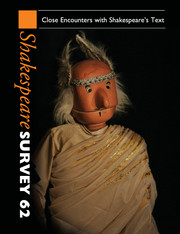Book contents
- Frontmatter
- Shakespeare, text and paratext
- The popularity of Shakespeare in print
- The continuing importance of new Bibliographical method
- ‘Honour the real thing’: Shakespeare, Trauma and Titus Andronicus in South Africa
- ‘O, these encounterers’: on Shakespeare’s meetings and partings
- A play of modals: Grammar and potential action in early Shakespeare
- Merry, marry, Mary: Shakespearian wordplay and Twelfth Night
- A subtle point: Sleeves, tents and ‘Ariachne’s broken woof’ (again)
- The look of Othello
- Red button Shakespeare
- ‘Mark you / his absolute shall?’: Multitudinous tongues and contested words in Coriolanus
- Chagall’s Tempest: An autobiographical reading
- Reading illustrated editions: Methodology and the limits of interpretation
- Close encounters with Anne Brontë's Shakespeare
- Shakespeare and the magic lantern
- Shakespeare and the coconuts: close encounters in post-apartheid South Africa
- The Schrödinger effect: Reading and misreading performance
- Behind the scenes
- Inner monologues: Realist acting and/as Shakespearian performance text
- More japanized, casual and transgender shakespeares
- Translation futures: Shakespearians and the foreign text
- After translation
- ‘The single and peculiar life’: Hamlet’s heart and the early modern subject
- Mapping King Lear
- ‘Last on the stage’: The place of Shakespeare in Charles Darwin’s ethology
- Sense/memory/sense-memory: Reading narratives of Shakespearian rehearsals
- Shakespeare performances in England (and Wales), 2008
- Professional Shakespeare productions in the British Isles, January–December 2007
- The Year's Contributions to Shakespearian Study 1 Critical Studies
- 2 Shakespeare in performance
- 3a Editions and textual studies
- 3b Editions and textual studies
- Index to Volume 62
The popularity of Shakespeare in print
Published online by Cambridge University Press: 28 November 2009
- Frontmatter
- Shakespeare, text and paratext
- The popularity of Shakespeare in print
- The continuing importance of new Bibliographical method
- ‘Honour the real thing’: Shakespeare, Trauma and Titus Andronicus in South Africa
- ‘O, these encounterers’: on Shakespeare’s meetings and partings
- A play of modals: Grammar and potential action in early Shakespeare
- Merry, marry, Mary: Shakespearian wordplay and Twelfth Night
- A subtle point: Sleeves, tents and ‘Ariachne’s broken woof’ (again)
- The look of Othello
- Red button Shakespeare
- ‘Mark you / his absolute shall?’: Multitudinous tongues and contested words in Coriolanus
- Chagall’s Tempest: An autobiographical reading
- Reading illustrated editions: Methodology and the limits of interpretation
- Close encounters with Anne Brontë's Shakespeare
- Shakespeare and the magic lantern
- Shakespeare and the coconuts: close encounters in post-apartheid South Africa
- The Schrödinger effect: Reading and misreading performance
- Behind the scenes
- Inner monologues: Realist acting and/as Shakespearian performance text
- More japanized, casual and transgender shakespeares
- Translation futures: Shakespearians and the foreign text
- After translation
- ‘The single and peculiar life’: Hamlet’s heart and the early modern subject
- Mapping King Lear
- ‘Last on the stage’: The place of Shakespeare in Charles Darwin’s ethology
- Sense/memory/sense-memory: Reading narratives of Shakespearian rehearsals
- Shakespeare performances in England (and Wales), 2008
- Professional Shakespeare productions in the British Isles, January–December 2007
- The Year's Contributions to Shakespearian Study 1 Critical Studies
- 2 Shakespeare in performance
- 3a Editions and textual studies
- 3b Editions and textual studies
- Index to Volume 62
Summary
This article assesses the scope of Shakespeare's bibliographic presence in the early modern period. We have long known that approximately half of Shakespeare's plays were published during his lifetime, that some were reprinted early on, and that thirty-six of them were gathered in the First Folio in 1623. Many companions to Shakespeare contain a chapter on the early editions: 'Shakespeare Published', 'Shakespeare's Plays in Print', 'Shakespeare Writ Small: Early Single Editions of Shakespeare's Plays', 'Shakespeare in Print, 1593-1640', and so on. The early chapters of David Scott Kastan's Shakespeare and the Book cover similar ground, and Andrew Murphy's Shakespeare in Print also devotes a chapter to 'The early quartos'. What these chapters, useful though they are, do not examine in any detail is the comparative popularity of Shakespeare in print: how present was Shakespeare as 'a man in print' compared to contemporary writers, in particular contemporary playwrights? Did Shakespeare sell well? Were his playbooks more or less popular than, say, Jonson's or Fletcher's? By how much? Judging by his presence as a man in print, what kind of authorial status did Shakespeare have in early modern England? These are some of the questions this article proposes to investigate.
It may be useful to start by taking a snapshot of the presence of Shakespeare's writings in the London book trade. Let us briefly look at a single year: 1600. It is true that this is an extraordinary year for Shakespeare, with more publications than in any other year during his life, yet the year's total book production, with approximately 300 titles produced and published in London, is also of unprecedented scope. The subject matter to which the greatest part of these titles was devoted is religion, which accounted for over a third of the total output.
- Type
- Chapter
- Information
- Shakespeare Survey , pp. 12 - 29Publisher: Cambridge University PressPrint publication year: 2009
- 2
- Cited by



